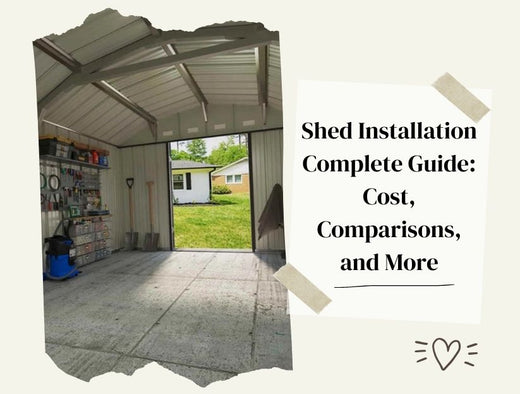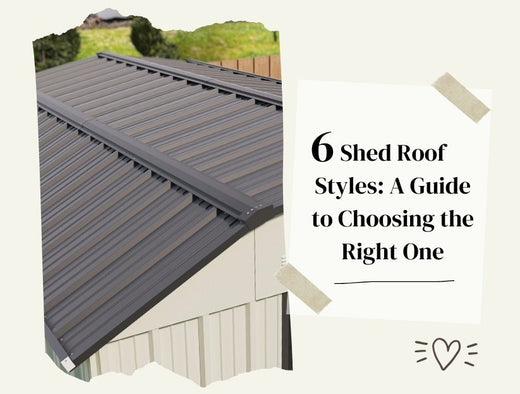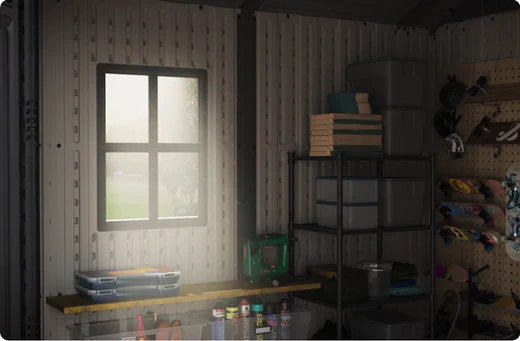Table of Contents:[hide]
Introduction
Need to store your stuff at home but don't have enough space and not sure how or where? Well, shed installation is the solution that we always choose! It is an amazing way to expand your storage space, and at the same time, elevate your property.
Understanding the shed installation process is important, whether you need to store garden tools, build a workshop, or just clean out your house—and that's what we are here for. This article is a step-by-step guide to shed costs, types, and considerations when installing a shed.
We'll discuss your options, share valuable tips, and give to make your shed installation project a success. Let's dive in and uncover why sheds are a great addition to your property!
Understanding Shed Installation Costs
When it comes to shed installation, costs can vary greatly depending on a lot of factors. A professionally fit shed costs between $1,000 and $15,000 in most of the cases. But prices range from $240 for a basic DIY kit to over $100,000 for large, custom-built installations. In terms of square feet–for better estimation, building a shed typically costs between $10 and $160 per square foot.
On the other hand, prefabricated choices are generally more affordable which range between $10 to $40 per square foot, while custom builds can be produced between $30 to $160 per square foot. At most, the key factors that influence shed installation costs are the size, materials, design complexity, site preparation, and labor.
If you want an accurate quotation for your particular project, don't hesitate to speak with shed installers or builders in your area. They can provide customized quotes based on your requirements and can adjust to your particular budget.
Shed Types and Cost Breakdown
Sheds are available in many varieties, each with unique uses tailored to your specific needs and costs. Below is a summary of the cost to build a shed according to popular shed types.
- Storage Sheds ($200 - $2,600) - The easiest and most practical buildings for storing tools and equipment are storage sheds. These sheds are among the cheapest types you can choose.
- Garden Sheds ($600 - $10,000) - Generally speaking, garden sheds are ideal for gardeners. These sheds are ideal for gardening because they often have windows and potting benches.
- Workshop Sheds ($5,000 - $16,000) - Usually, these sheds are made for do-it-yourself tasks. Workshop sheds frequently include a large workspace for working on different home tasks, including making furniture, as well as electrical wiring and insulation for your power equipment
- Modern Sheds ($5,000 - $16,000) - Modern sheds are sleek and fashionable. They can be a great addition to your house because they can serve as guest rooms or home offices.
- Garage Sheds ($7,000 - $10,400) - Garden sheds provide plenty of space for storage. They are large enough to fit cars and offer lots of storage space.
- Farm Implement Sheds ($3,000 - $40,000) - Tractors and other large agricultural equipment can be stored in farm implement sheds.
- Commercial Sheds ($25,000 - $80,000) - Since commercial sheds are designed for commercial usage, they are the largest and most expensive option when it comes to installing sheds.
When selecting a shed type for your home improvement project, always consider your individual requirements, available space, and budget. Also, take note that customizations and additional features will increase the overall cost of the shed installation.
Read more shed roof buying guide here: 6 Shed Roof Styles: A Guide to Choosing the Right One
Factors Influencing Shed Installation Cost
There are several factors that can significantly influence the cost of your shed installation project. From size, material, design that you want, or even the contractor you have hired to do the job. Here is a compilation of price differences in the different factors in shed installation:
1. Size: Costs usually go up for larger sheds since they require more work and supplies. For instance, the price of a 20x24 foot shed may range from $4,800 to $76,800, while the price of a 4x6 foot shed might be between $240 and $960.
2. Materials: The material of choice affects the durability and cost of a shed. It is very important to choose a material suitable for your living conditions and environment.
- Wood Material: $1,000-$4,300
- Metal Material: $200-$7,000
- Plastic Material: $369-$4,000
- Concrete Material: $10,000-$28,000
- Brick Material: $15,000-$30,000
3. Foundation: The foundation is another consideration when installing a shed. Installing a shed requires a strong foundation.
- Gravel pad foundation: $1-$2 per square foot
- Concrete slab foundation: $4-$12 per square foot
4. Permits: Depending on your area, building permits can be requested. They can cost as much as $2,000, but they usually cost about $250.
5. Labor: Depending on the contractor you choose and the complexity of the project, professional installation usually costs between $200 and $6,000.
6. Customizations: Costs can go up high if you add insulation, windows, or electrical wiring.
DIY vs. Professional Installation
There are a lot of benefits to installing a shed by yourself. Since you are doing the work yourself, it will help you save quite a bit of labor costs. It also allows you to work at your own speed and schedule. Aside from that, it can also give you a great deal of personal satisfaction as a homeowner to tackle such a project on your own.
However, DIY installation is not without its disadvantages. DIY can become time-consuming and you may need to learn particular tools and skills to get the job done. There's also more room for errors, which could compromise your shed's overall functionality.
It is also important to note that many manufacturers will void warranties on your shed if it is not professionally installed. So always make sure you read the terms before embarking on the DIY installation.
On the other hand, there is also an advantage to building a shed professionally. Installers add their skills and experience to the task. So they make sure it's done efficiently and right. This method is usually more efficient for the homeowner because professionals can fit in the installation much quicker and with their own tools.
There's also the assurance and peace of mind because professional work often promises good quality and may even include warranties. But there are limitations too. Installation by a professional is usually more expensive upfront than a DIY approach because you are also paying for labor.
In this approach, you may have less control over the installation itself–such as scheduling and the work involved because you will be relying on the installer's schedule and methods. Weighing the pros and the cons, DIY installation can be a cheaper option for simple, prefabricated sheds if you are handy and have the right tools.
That's why when it comes to Patiowell, our Kick-it and Fit-it series sheds can save 35% of screws, making it easy to install and time-saving. Our sheds are perfect for DIY installation and allows you to save a lot of headache too.
When you choose this route, DIY shed kits can cost between $240 to $4,000 depending on size and materials. But for larger, more complicated sheds or if you lack the time or ability to install it yourself, depending on the size of the installation, most expert installers charge between $50 and $100 per hour or even a flat rate.
Whether it is DIY or professional installation, always take into account your budget, time, skills, and the complexity of your chosen shed. However, with us, you can build your own shed without breaking your back.
Conclusion
Shed installation in your home is truly a valuable investment that can enhance your property management. You can easily determine which type of shed meets your needs by understanding the types, costs, along other important installation factors.
Whether you want to do it yourself or hire a professional shed installer—the secret to a good shed build is preparation. Always take into mind your long-term needs and any local restrictions when you venture into this shed installation journey.
Choose us, Patiowell, and we'll help you install a shed now and you will have more storage space along with a brand-new functional area for years to come. Ready to start your shed installation project? Go to our website and choose the right shed for you!
Shed Installation FAQs
Q1: How long does it take to install a shed?
Installation time for a shed ranges from a few hours for small, prefab sheds to several days for custom builds and large sheds. If you do a professional installation, expect 1-3 days on average.
Q2: Do I need a permit to install a shed?
Permit requirements differ depending on the location. Sheds less than 120 square feet usually don't require permits, but make sure to always check the rules in your area.
Q3: What's the best foundation for a shed?
The best option is determined by your local climate, shed size, and budget. While gravel is less expensive, concrete slabs are more resilient to moisture and more long-lasting.
Q4: Can I install a shed myself?
You, you can! With a kit, you can install a shed on your own. However, hiring a professional to install complicated or huge sheds is more efficient.
Q5: How much does it cost to add electricity to a shed?
A shed's electrical installation normally costs between $250 and $300 per wiring installation. However, the location of your shed and the state of your home's electrical wiring may affect this cost.
Diana Mason
Hi there! I’m Diana Mason, the chief editor of Patiowell brand. With over 15 years of diving deep into the world of outdoor furniture, I’ve developed a keen eye for what makes outdoor spaces truly special. I love sharing tips and inspiration to help you create your perfect backyard retreat. Our blog is a reflection of my passion and expertise, featuring only the best pieces that I personally vouch for. Thanks for stopping by—I can't wait to help you transform your outdoor living space!








Leave a comment
All comments are moderated before being published.
This site is protected by hCaptcha and the hCaptcha Privacy Policy and Terms of Service apply.